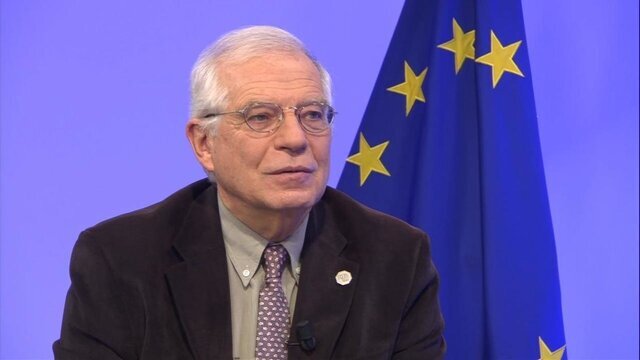Borrell says sanctions must not prevent delivery of humanitarian aid to Iran

TEHRAN - European Union foreign policy chief Josep Borrell has said that sanctions on Iran must not prevent delivery of humanitarian aid to Iran when the country is fighting the coronavirus.
“In the case of the United Nations and the European Union, it is quite clear that our sanctions are not a problem from the point of view of facilitating humanitarian aid. But we ask that this be done [also] by other countries that have established sanctions, and that there be humanitarian exemptions to provide medical supplies and equipment to the countries that are subject to sanctions: Cuba, Iran, the North Korea, Syria, Venezuela, [so that sanctions] do not prevent the delivery of humanitarian aid,” he said on Monday at a press conference, according to EU website.
He added, “I think that it is absolutely necessary to clarify this subject, because there are financial actors who are very reluctant to participate in the flow of humanitarian aid because they are afraid of falling under sanctions. It is imperative that this be made clear, that in these circumstances, more than ever, there will be no sanctions for those who participate in the exchange of goods and services which have to do with more necessary humanitarian aid.”
Mikhail Ulyanov, Russia’s permanent representative to the Vienna-based international organizations, tweeted on Tuesday, “#US is not ready to think about sanctions relief for #Iran. OK, leave alone humanitarian considerations. In any case this is not pragmatic taking into account that COVID-19 can spill over to neighboring countries and affect 70,000 US troops in the region and a lot of US civilians.”
Foreign ministers of the European Union have urged suspension of the U.S. sanctions against countries, including Iran, in the fight against the coronavirus.
Spanish Foreign Minister Arancha Gonzalez Laya told reporters that the issue was discussed in a meeting on Friday, according to ISNA.
She noted that the sanctions must be removed when there is human rights urgency like outbreak of the coronavirus.
Dane Rowlands, a professor at Carleton University, has said it is “regrettable” that the United States is refusing to ease sanctions on Iran while the country is fighting the coronavirus pandemic.
“The United States can reduce restrictions and facilitate Iran’s access to medicine, however, the government of the United States does not prioritize this issue which is regrettable,” Rowlands told ILNA in an interview published on Monday.
He noted that innocent people are losing their lives in Iran due to lack of access to medicine resulting from U.S. sanctions.
A UN human rights expert called on March 31 for lifting international sanctions against countries ranging from Iran to North Korea and Venezuela in coronavirus crisis, according to Reuters.
“The continued imposition of crippling economic sanctions on Syria, Venezuela, Iran, Cuba, and, to a lesser degree, Zimbabwe, to name the most prominent instances, severely undermines the ordinary citizens’ fundamental right to sufficient and adequate food,” Hilal Elver, UN special rapporteur on the right to food, said in a statement.
Elver, an independent expert, said that it was a matter of “humanitarian and practical urgency to lift unilateral economic sanctions immediately”.
In a letter to the G-20 economic powers on March 24, UN Secretary-General Antonio Guterres called for rolling back international sanctions regimes around the world.
Guterres said sanctions are heightening the health risks for millions of people and weakening the global effort to contain the spread of the new coronavirus, Foreign Policy reported.
“I am encouraging the waiving of sanctions imposed on countries to ensure access to food, essential health supplies, and COVID-19 medical support. This is the time for solidarity, not exclusion,” he said.
“Let us remember that we are only as strong as the weakest health system in our interconnected world,” the UN chief said.
Michelle Bachelet, the UN high commissioner for human rights, also said on March 24 that “in a context of global pandemic, impeding medical efforts in one country heightens the risk for all of us.”
“At this crucial time, both for global public health reasons, and to support the rights and lives of millions of people in these countries, sectoral sanctions should be eased or suspended,” she said in a statement.
NA/PA
